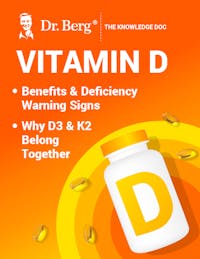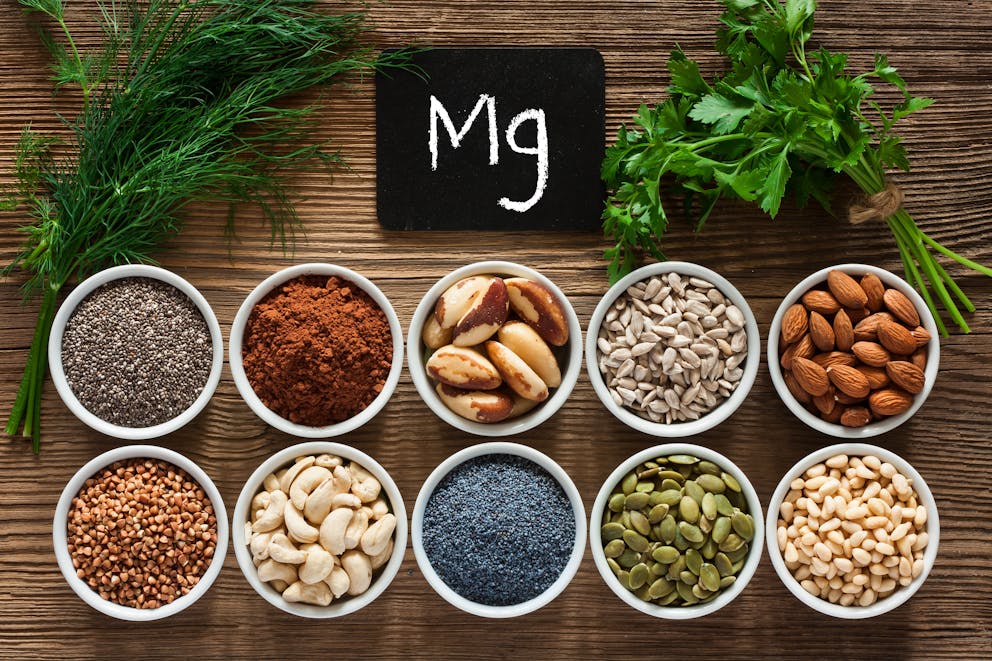Why Take Magnesium with Vitamin D? Benefits Explained

Magnesium Cheat Sheet
Understand magnesium's role in maintaining health and preventing disease
Recognize early signs and common causes of magnesium deficiency
Discover practical tips for incorporating magnesium into your diet
Explore the best forms of magnesium supplements and which ones to avoid
Find out why you should always take magnesium and vitamin D3 together

Magnesium Cheat Sheet
Understand magnesium's role in maintaining health and preventing disease
Recognize early signs and common causes of magnesium deficiency
Discover practical tips for incorporating magnesium into your diet
Explore the best forms of magnesium supplements and which ones to avoid
Find out why you should always take magnesium and vitamin D3 together

Magnesium Cheat Sheet
Understand magnesium's role in maintaining health and preventing disease
Recognize early signs and common causes of magnesium deficiency
Discover practical tips for incorporating magnesium into your diet
Explore the best forms of magnesium supplements and which ones to avoid
Find out why you should always take magnesium and vitamin D3 together

Magnesium Cheat Sheet
Understand magnesium's role in maintaining health and preventing disease
Recognize early signs and common causes of magnesium deficiency
Discover practical tips for incorporating magnesium into your diet
Explore the best forms of magnesium supplements and which ones to avoid
Find out why you should always take magnesium and vitamin D3 together

Magnesium Cheat Sheet
Understand magnesium's role in maintaining health and preventing disease
Recognize early signs and common causes of magnesium deficiency
Discover practical tips for incorporating magnesium into your diet
Explore the best forms of magnesium supplements and which ones to avoid
Find out why you should always take magnesium and vitamin D3 together

Magnesium Cheat Sheet
Understand magnesium's role in maintaining health and preventing disease
Recognize early signs and common causes of magnesium deficiency
Discover practical tips for incorporating magnesium into your diet
Explore the best forms of magnesium supplements and which ones to avoid
Find out why you should always take magnesium and vitamin D3 together

Magnesium Cheat Sheet
Understand magnesium's role in maintaining health and preventing disease
Recognize early signs and common causes of magnesium deficiency
Discover practical tips for incorporating magnesium into your diet
Explore the best forms of magnesium supplements and which ones to avoid
Find out why you should always take magnesium and vitamin D3 together

Magnesium Cheat Sheet
Understand magnesium's role in maintaining health and preventing disease
Recognize early signs and common causes of magnesium deficiency
Discover practical tips for incorporating magnesium into your diet
Explore the best forms of magnesium supplements and which ones to avoid
Find out why you should always take magnesium and vitamin D3 together

Magnesium Cheat Sheet
Understand magnesium's role in maintaining health and preventing disease
Recognize early signs and common causes of magnesium deficiency
Discover practical tips for incorporating magnesium into your diet
Explore the best forms of magnesium supplements and which ones to avoid
Find out why you should always take magnesium and vitamin D3 together

Magnesium Cheat Sheet
Understand magnesium's role in maintaining health and preventing disease
Recognize early signs and common causes of magnesium deficiency
Discover practical tips for incorporating magnesium into your diet
Explore the best forms of magnesium supplements and which ones to avoid
Find out why you should always take magnesium and vitamin D3 together

Magnesium Cheat Sheet
Understand magnesium's role in maintaining health and preventing disease
Recognize early signs and common causes of magnesium deficiency
Discover practical tips for incorporating magnesium into your diet
Explore the best forms of magnesium supplements and which ones to avoid
Find out why you should always take magnesium and vitamin D3 together

Magnesium Cheat Sheet
Understand magnesium's role in maintaining health and preventing disease
Recognize early signs and common causes of magnesium deficiency
Discover practical tips for incorporating magnesium into your diet
Explore the best forms of magnesium supplements and which ones to avoid
Find out why you should always take magnesium and vitamin D3 together

Magnesium Cheat Sheet
Understand magnesium's role in maintaining health and preventing disease
Recognize early signs and common causes of magnesium deficiency
Discover practical tips for incorporating magnesium into your diet
Explore the best forms of magnesium supplements and which ones to avoid
Find out why you should always take magnesium and vitamin D3 together

Magnesium Cheat Sheet
Understand magnesium's role in maintaining health and preventing disease
Recognize early signs and common causes of magnesium deficiency
Discover practical tips for incorporating magnesium into your diet
Explore the best forms of magnesium supplements and which ones to avoid
Find out why you should always take magnesium and vitamin D3 together

Magnesium Cheat Sheet
Understand magnesium's role in maintaining health and preventing disease
Recognize early signs and common causes of magnesium deficiency
Discover practical tips for incorporating magnesium into your diet
Explore the best forms of magnesium supplements and which ones to avoid
Find out why you should always take magnesium and vitamin D3 together

Magnesium Cheat Sheet
Understand magnesium's role in maintaining health and preventing disease
Recognize early signs and common causes of magnesium deficiency
Discover practical tips for incorporating magnesium into your diet
Explore the best forms of magnesium supplements and which ones to avoid
Find out why you should always take magnesium and vitamin D3 together

Magnesium Cheat Sheet
Understand magnesium's role in maintaining health and preventing disease
Recognize early signs and common causes of magnesium deficiency
Discover practical tips for incorporating magnesium into your diet
Explore the best forms of magnesium supplements and which ones to avoid
Find out why you should always take magnesium and vitamin D3 together

Magnesium Cheat Sheet
Understand magnesium's role in maintaining health and preventing disease
Recognize early signs and common causes of magnesium deficiency
Discover practical tips for incorporating magnesium into your diet
Explore the best forms of magnesium supplements and which ones to avoid
Find out why you should always take magnesium and vitamin D3 together

Magnesium Cheat Sheet
Understand magnesium's role in maintaining health and preventing disease
Recognize early signs and common causes of magnesium deficiency
Discover practical tips for incorporating magnesium into your diet
Explore the best forms of magnesium supplements and which ones to avoid
Find out why you should always take magnesium and vitamin D3 together

Magnesium Cheat Sheet
Understand magnesium's role in maintaining health and preventing disease
Recognize early signs and common causes of magnesium deficiency
Discover practical tips for incorporating magnesium into your diet
Explore the best forms of magnesium supplements and which ones to avoid
Find out why you should always take magnesium and vitamin D3 together

Magnesium Cheat Sheet
Understand magnesium's role in maintaining health and preventing disease
Recognize early signs and common causes of magnesium deficiency
Discover practical tips for incorporating magnesium into your diet
Explore the best forms of magnesium supplements and which ones to avoid
Find out why you should always take magnesium and vitamin D3 together

Magnesium Cheat Sheet
Understand magnesium's role in maintaining health and preventing disease
Recognize early signs and common causes of magnesium deficiency
Discover practical tips for incorporating magnesium into your diet
Explore the best forms of magnesium supplements and which ones to avoid
Find out why you should always take magnesium and vitamin D3 together

Magnesium Cheat Sheet
Understand magnesium's role in maintaining health and preventing disease
Recognize early signs and common causes of magnesium deficiency
Discover practical tips for incorporating magnesium into your diet
Explore the best forms of magnesium supplements and which ones to avoid
Find out why you should always take magnesium and vitamin D3 together

Magnesium Cheat Sheet
Understand magnesium's role in maintaining health and preventing disease
Recognize early signs and common causes of magnesium deficiency
Discover practical tips for incorporating magnesium into your diet
Explore the best forms of magnesium supplements and which ones to avoid
Find out why you should always take magnesium and vitamin D3 together

Magnesium Cheat Sheet
Understand magnesium's role in maintaining health and preventing disease
Recognize early signs and common causes of magnesium deficiency
Discover practical tips for incorporating magnesium into your diet
Explore the best forms of magnesium supplements and which ones to avoid
Find out why you should always take magnesium and vitamin D3 together

Magnesium Cheat Sheet
Understand magnesium's role in maintaining health and preventing disease
Recognize early signs and common causes of magnesium deficiency
Discover practical tips for incorporating magnesium into your diet
Explore the best forms of magnesium supplements and which ones to avoid
Find out why you should always take magnesium and vitamin D3 together

Magnesium Cheat Sheet
Understand magnesium's role in maintaining health and preventing disease
Recognize early signs and common causes of magnesium deficiency
Discover practical tips for incorporating magnesium into your diet
Explore the best forms of magnesium supplements and which ones to avoid
Find out why you should always take magnesium and vitamin D3 together

Magnesium Cheat Sheet
Understand magnesium's role in maintaining health and preventing disease
Recognize early signs and common causes of magnesium deficiency
Discover practical tips for incorporating magnesium into your diet
Explore the best forms of magnesium supplements and which ones to avoid
Find out why you should always take magnesium and vitamin D3 together

Magnesium Cheat Sheet
Understand magnesium's role in maintaining health and preventing disease
Recognize early signs and common causes of magnesium deficiency
Discover practical tips for incorporating magnesium into your diet
Explore the best forms of magnesium supplements and which ones to avoid
Find out why you should always take magnesium and vitamin D3 together

Magnesium Cheat Sheet
Understand magnesium's role in maintaining health and preventing disease
Recognize early signs and common causes of magnesium deficiency
Discover practical tips for incorporating magnesium into your diet
Explore the best forms of magnesium supplements and which ones to avoid
Find out why you should always take magnesium and vitamin D3 together

Magnesium Cheat Sheet
Understand magnesium's role in maintaining health and preventing disease
Recognize early signs and common causes of magnesium deficiency
Discover practical tips for incorporating magnesium into your diet
Explore the best forms of magnesium supplements and which ones to avoid
Find out why you should always take magnesium and vitamin D3 together

Magnesium Cheat Sheet
Understand magnesium's role in maintaining health and preventing disease
Recognize early signs and common causes of magnesium deficiency
Discover practical tips for incorporating magnesium into your diet
Explore the best forms of magnesium supplements and which ones to avoid
Find out why you should always take magnesium and vitamin D3 together

Magnesium Cheat Sheet
Understand magnesium's role in maintaining health and preventing disease
Recognize early signs and common causes of magnesium deficiency
Discover practical tips for incorporating magnesium into your diet
Explore the best forms of magnesium supplements and which ones to avoid
Find out why you should always take magnesium and vitamin D3 together

Magnesium Cheat Sheet
Understand magnesium's role in maintaining health and preventing disease
Recognize early signs and common causes of magnesium deficiency
Discover practical tips for incorporating magnesium into your diet
Explore the best forms of magnesium supplements and which ones to avoid
Find out why you should always take magnesium and vitamin D3 together

Magnesium Cheat Sheet
Understand magnesium's role in maintaining health and preventing disease
Recognize early signs and common causes of magnesium deficiency
Discover practical tips for incorporating magnesium into your diet
Explore the best forms of magnesium supplements and which ones to avoid
Find out why you should always take magnesium and vitamin D3 together

Magnesium Cheat Sheet
Understand magnesium's role in maintaining health and preventing disease
Recognize early signs and common causes of magnesium deficiency
Discover practical tips for incorporating magnesium into your diet
Explore the best forms of magnesium supplements and which ones to avoid
Find out why you should always take magnesium and vitamin D3 together

Vitamin D – Benefits and Deficiency Warning Signs
Learn to recognize early signs of vitamin D deficiency
Discover how to maintain healthy vitamin D levels
Explore common factors that can contribute to vitamin D deficiency
Understand why vitamin D3 and K2 should always be taken together
Get practical advice on how to maximize the health benefits of vitamin D

Vitamin D – Benefits and Deficiency Warning Signs
Learn to recognize early signs of vitamin D deficiency
Discover how to maintain healthy vitamin D levels
Explore common factors that can contribute to vitamin D deficiency
Understand why vitamin D3 and K2 should always be taken together
Get practical advice on how to maximize the health benefits of vitamin D

Vitamin D – Benefits and Deficiency Warning Signs
Learn to recognize early signs of vitamin D deficiency
Discover how to maintain healthy vitamin D levels
Explore common factors that can contribute to vitamin D deficiency
Understand why vitamin D3 and K2 should always be taken together
Get practical advice on how to maximize the health benefits of vitamin D

Vitamin D – Benefits and Deficiency Warning Signs
Learn to recognize early signs of vitamin D deficiency
Discover how to maintain healthy vitamin D levels
Explore common factors that can contribute to vitamin D deficiency
Understand why vitamin D3 and K2 should always be taken together
Get practical advice on how to maximize the health benefits of vitamin D

Vitamin D – Benefits and Deficiency Warning Signs
Learn to recognize early signs of vitamin D deficiency
Discover how to maintain healthy vitamin D levels
Explore common factors that can contribute to vitamin D deficiency
Understand why vitamin D3 and K2 should always be taken together
Get practical advice on how to maximize the health benefits of vitamin D

Vitamin D – Benefits and Deficiency Warning Signs
Learn to recognize early signs of vitamin D deficiency
Discover how to maintain healthy vitamin D levels
Explore common factors that can contribute to vitamin D deficiency
Understand why vitamin D3 and K2 should always be taken together
Get practical advice on how to maximize the health benefits of vitamin D

Vitamin D – Benefits and Deficiency Warning Signs
Learn to recognize early signs of vitamin D deficiency
Discover how to maintain healthy vitamin D levels
Explore common factors that can contribute to vitamin D deficiency
Understand why vitamin D3 and K2 should always be taken together
Get practical advice on how to maximize the health benefits of vitamin D

Vitamin D – Benefits and Deficiency Warning Signs
Learn to recognize early signs of vitamin D deficiency
Discover how to maintain healthy vitamin D levels
Explore common factors that can contribute to vitamin D deficiency
Understand why vitamin D3 and K2 should always be taken together
Get practical advice on how to maximize the health benefits of vitamin D

Vitamin D – Benefits and Deficiency Warning Signs
Learn to recognize early signs of vitamin D deficiency
Discover how to maintain healthy vitamin D levels
Explore common factors that can contribute to vitamin D deficiency
Understand why vitamin D3 and K2 should always be taken together
Get practical advice on how to maximize the health benefits of vitamin D

Vitamin D – Benefits and Deficiency Warning Signs
Learn to recognize early signs of vitamin D deficiency
Discover how to maintain healthy vitamin D levels
Explore common factors that can contribute to vitamin D deficiency
Understand why vitamin D3 and K2 should always be taken together
Get practical advice on how to maximize the health benefits of vitamin D

Vitamin D – Benefits and Deficiency Warning Signs
Learn to recognize early signs of vitamin D deficiency
Discover how to maintain healthy vitamin D levels
Explore common factors that can contribute to vitamin D deficiency
Understand why vitamin D3 and K2 should always be taken together
Get practical advice on how to maximize the health benefits of vitamin D

Vitamin D – Benefits and Deficiency Warning Signs
Learn to recognize early signs of vitamin D deficiency
Discover how to maintain healthy vitamin D levels
Explore common factors that can contribute to vitamin D deficiency
Understand why vitamin D3 and K2 should always be taken together
Get practical advice on how to maximize the health benefits of vitamin D

Vitamin D – Benefits and Deficiency Warning Signs
Learn to recognize early signs of vitamin D deficiency
Discover how to maintain healthy vitamin D levels
Explore common factors that can contribute to vitamin D deficiency
Understand why vitamin D3 and K2 should always be taken together
Get practical advice on how to maximize the health benefits of vitamin D

Vitamin D – Benefits and Deficiency Warning Signs
Learn to recognize early signs of vitamin D deficiency
Discover how to maintain healthy vitamin D levels
Explore common factors that can contribute to vitamin D deficiency
Understand why vitamin D3 and K2 should always be taken together
Get practical advice on how to maximize the health benefits of vitamin D

Vitamin D – Benefits and Deficiency Warning Signs
Learn to recognize early signs of vitamin D deficiency
Discover how to maintain healthy vitamin D levels
Explore common factors that can contribute to vitamin D deficiency
Understand why vitamin D3 and K2 should always be taken together
Get practical advice on how to maximize the health benefits of vitamin D

Vitamin D – Benefits and Deficiency Warning Signs
Learn to recognize early signs of vitamin D deficiency
Discover how to maintain healthy vitamin D levels
Explore common factors that can contribute to vitamin D deficiency
Understand why vitamin D3 and K2 should always be taken together
Get practical advice on how to maximize the health benefits of vitamin D

Vitamin D – Benefits and Deficiency Warning Signs
Learn to recognize early signs of vitamin D deficiency
Discover how to maintain healthy vitamin D levels
Explore common factors that can contribute to vitamin D deficiency
Understand why vitamin D3 and K2 should always be taken together
Get practical advice on how to maximize the health benefits of vitamin D

Vitamin D – Benefits and Deficiency Warning Signs
Learn to recognize early signs of vitamin D deficiency
Discover how to maintain healthy vitamin D levels
Explore common factors that can contribute to vitamin D deficiency
Understand why vitamin D3 and K2 should always be taken together
Get practical advice on how to maximize the health benefits of vitamin D

Vitamin D – Benefits and Deficiency Warning Signs
Learn to recognize early signs of vitamin D deficiency
Discover how to maintain healthy vitamin D levels
Explore common factors that can contribute to vitamin D deficiency
Understand why vitamin D3 and K2 should always be taken together
Get practical advice on how to maximize the health benefits of vitamin D

Vitamin D – Benefits and Deficiency Warning Signs
Learn to recognize early signs of vitamin D deficiency
Discover how to maintain healthy vitamin D levels
Explore common factors that can contribute to vitamin D deficiency
Understand why vitamin D3 and K2 should always be taken together
Get practical advice on how to maximize the health benefits of vitamin D

Vitamin D – Benefits and Deficiency Warning Signs
Learn to recognize early signs of vitamin D deficiency
Discover how to maintain healthy vitamin D levels
Explore common factors that can contribute to vitamin D deficiency
Understand why vitamin D3 and K2 should always be taken together
Get practical advice on how to maximize the health benefits of vitamin D

Vitamin D – Benefits and Deficiency Warning Signs
Learn to recognize early signs of vitamin D deficiency
Discover how to maintain healthy vitamin D levels
Explore common factors that can contribute to vitamin D deficiency
Understand why vitamin D3 and K2 should always be taken together
Get practical advice on how to maximize the health benefits of vitamin D

Vitamin D – Benefits and Deficiency Warning Signs
Learn to recognize early signs of vitamin D deficiency
Discover how to maintain healthy vitamin D levels
Explore common factors that can contribute to vitamin D deficiency
Understand why vitamin D3 and K2 should always be taken together
Get practical advice on how to maximize the health benefits of vitamin D

Vitamin D – Benefits and Deficiency Warning Signs
Learn to recognize early signs of vitamin D deficiency
Discover how to maintain healthy vitamin D levels
Explore common factors that can contribute to vitamin D deficiency
Understand why vitamin D3 and K2 should always be taken together
Get practical advice on how to maximize the health benefits of vitamin D

Vitamin D – Benefits and Deficiency Warning Signs
Learn to recognize early signs of vitamin D deficiency
Discover how to maintain healthy vitamin D levels
Explore common factors that can contribute to vitamin D deficiency
Understand why vitamin D3 and K2 should always be taken together
Get practical advice on how to maximize the health benefits of vitamin D

Vitamin D – Benefits and Deficiency Warning Signs
Learn to recognize early signs of vitamin D deficiency
Discover how to maintain healthy vitamin D levels
Explore common factors that can contribute to vitamin D deficiency
Understand why vitamin D3 and K2 should always be taken together
Get practical advice on how to maximize the health benefits of vitamin D

Vitamin D – Benefits and Deficiency Warning Signs
Learn to recognize early signs of vitamin D deficiency
Discover how to maintain healthy vitamin D levels
Explore common factors that can contribute to vitamin D deficiency
Understand why vitamin D3 and K2 should always be taken together
Get practical advice on how to maximize the health benefits of vitamin D

Vitamin D – Benefits and Deficiency Warning Signs
Learn to recognize early signs of vitamin D deficiency
Discover how to maintain healthy vitamin D levels
Explore common factors that can contribute to vitamin D deficiency
Understand why vitamin D3 and K2 should always be taken together
Get practical advice on how to maximize the health benefits of vitamin D

Vitamin D – Benefits and Deficiency Warning Signs
Learn to recognize early signs of vitamin D deficiency
Discover how to maintain healthy vitamin D levels
Explore common factors that can contribute to vitamin D deficiency
Understand why vitamin D3 and K2 should always be taken together
Get practical advice on how to maximize the health benefits of vitamin D

Vitamin D – Benefits and Deficiency Warning Signs
Learn to recognize early signs of vitamin D deficiency
Discover how to maintain healthy vitamin D levels
Explore common factors that can contribute to vitamin D deficiency
Understand why vitamin D3 and K2 should always be taken together
Get practical advice on how to maximize the health benefits of vitamin D

Vitamin D – Benefits and Deficiency Warning Signs
Learn to recognize early signs of vitamin D deficiency
Discover how to maintain healthy vitamin D levels
Explore common factors that can contribute to vitamin D deficiency
Understand why vitamin D3 and K2 should always be taken together
Get practical advice on how to maximize the health benefits of vitamin D

Vitamin D – Benefits and Deficiency Warning Signs
Learn to recognize early signs of vitamin D deficiency
Discover how to maintain healthy vitamin D levels
Explore common factors that can contribute to vitamin D deficiency
Understand why vitamin D3 and K2 should always be taken together
Get practical advice on how to maximize the health benefits of vitamin D

Vitamin D – Benefits and Deficiency Warning Signs
Learn to recognize early signs of vitamin D deficiency
Discover how to maintain healthy vitamin D levels
Explore common factors that can contribute to vitamin D deficiency
Understand why vitamin D3 and K2 should always be taken together
Get practical advice on how to maximize the health benefits of vitamin D

Vitamin D – Benefits and Deficiency Warning Signs
Learn to recognize early signs of vitamin D deficiency
Discover how to maintain healthy vitamin D levels
Explore common factors that can contribute to vitamin D deficiency
Understand why vitamin D3 and K2 should always be taken together
Get practical advice on how to maximize the health benefits of vitamin D

Vitamin D – Benefits and Deficiency Warning Signs
Learn to recognize early signs of vitamin D deficiency
Discover how to maintain healthy vitamin D levels
Explore common factors that can contribute to vitamin D deficiency
Understand why vitamin D3 and K2 should always be taken together
Get practical advice on how to maximize the health benefits of vitamin D

Vitamin D – Benefits and Deficiency Warning Signs
Learn to recognize early signs of vitamin D deficiency
Discover how to maintain healthy vitamin D levels
Explore common factors that can contribute to vitamin D deficiency
Understand why vitamin D3 and K2 should always be taken together
Get practical advice on how to maximize the health benefits of vitamin D
Magnesium and vitamin D metabolism are closely linked, and inadequate magnesium levels can lead to vitamin D deficiency despite plenty of sunlight exposure and vitamin D supplementation.
Discover why it’s best to take magnesium with vitamin D and how to combine these two essential nutrients properly.

What is vitamin D?
Vitamin D, also known as the sunshine vitamin, is produced when the skin is exposed to sunlight.
Ultraviolet B (UVB) radiation in sunlight can penetrate the skin and trigger a biochemical chain reaction that converts a cholesterol-containing compound into vitamin D3, which undergoes enzymatic activation in the liver and kidneys.
How much vitamin D the body produces depends on several factors, including average UVB light exposure, skin tone, body weight, health status, and geographical location.
Vitamin D is a fat-soluble vitamin that can be stored in the liver and fat cells for extended periods. However, prolonged lack of sun exposure can deplete body stores and lead to low vitamin D levels.
Benefits of vitamin D
Vitamin D is crucial for optimal health and plays a vital role in skeletal health, immune system functions, blood pressure regulation, and heart health.
“Most cells in the body have vitamin D receptors, which indicates that vitamin D influences a wide range of cellular and biochemical processes,” explains Dr. Berg.
Vitamin D stimulates the intestinal absorption of dietary and supplemental calcium, which is essential for developing strong bones, and healthy vitamin D levels are linked to a lower risk of bone fractures and osteoporosis.
Vitamin D also stimulates the activity of immune cells, your primary defense mechanisms against diseases and microbial infections, and lowers the risk of autoimmune conditions such as Crohn’s disease, multiple sclerosis, and rheumatoid arthritis.
In addition, vitamin D helps maintain healthy blood vessels, and deficiency is associated with narrowing arteries—a prime risk factor for hypertension, atherosclerosis, and heart disease.
Research published in Cureus found that vitamin D deficiency can cause depression in teens and adults and may contribute to anxiety disorders.
Vitamin D influences various brain regions and regulates the production of serotonin, a crucial neurotransmitter that regulates moods and emotions.
Watch the video below to learn more about the interesting relationship between magnesium and vitamin D.
Magnesium and Vitamin D: Interesting Relationship
Magnesium and Vitamin D: Interesting Relationship
What is magnesium?
Magnesium is a crucial component of various enzymes that facilitate cellular and metabolic pathways for energy production, hormone synthesis, bone health, digestion, and other physiological processes.
“Magnesium is needed for more than 300 biochemical reactions,” says Dr. Berg. “This explains why low magnesium levels can have a wide range of health consequences, including impaired metabolic health, gastrointestinal issues, and an increased risk of arrhythmia and heart disease.”
Magnesium doesn’t stay long in the body and can quickly be depleted by alcohol, stress, sugar, and excessive caffeine, leaving many at risk of deficiency.
Benefits of magnesium
Magnesium is an essential mineral that regulates the proper functioning of nerves, muscles, and immune cells, and magnesium deficiency can lead to significant health complications.
Magnesium regulates vascular muscles, which promotes healthy blood vessels needed for proper blood pressure regulation.
In addition, magnesium relaxes muscle fibers, which plays a crucial role in musculoskeletal health and counteracts physical tension caused by stress, excessive exercise, or injuries.
Balanced neurotransmitter production requires adequate magnesium levels. This may explain why magnesium has calming effects on the nervous system and can help improve symptoms of anxiety and depression.
Magnesium has many health benefits, and a study published in Scientifica found that magnesium can be an effective tool in the management or prevention of various health issues.
These health conditions may benefit from magnesium supplementation:
Diabetes
Hypertension
Metabolic disorders
Severe asthma
Premenstrual syndrome
Hyperlipidemia
Depression and other mood disorders
Cardiac arrhythmia

Why take magnesium with vitamin D?
The enzymes in the liver and kidneys that convert vitamin D into its active form require adequate magnesium levels to work.
Research published in Missouri Medicine found that magnesium deficiency can cause insufficient levels of active vitamin D, linked to poor calcium absorption, impaired immune defenses, and an increased risk of mood disorders.
In addition, insufficient vitamin D levels have been shown to impair intestinal magnesium absorption, which can contribute to low magnesium levels and consequently worsen vitamin D deficiency.
Because of their synergistic interplay, taking magnesium with vitamin D can enhance their effectiveness and health benefits.
A study published in the World Journal of Diabetes found that magnesium and vitamin D intake is linked to a lower risk of insulin resistance, diabetes, and cardiovascular disease.

How much magnesium should you take with vitamin D?
A report published by The Harvard School of Public Health suggests that a daily magnesium intake of 420 mg for men and 320 mg for women is adequate to maintain a healthy magnesium status.
However, individuals with malabsorption issues, athletes, and those with diabetes and high blood pressure may require higher doses to maintain sufficient magnesium levels.
How much vitamin D you should take depends on your vitamin D levels, average sun exposure, age, skin tone, and health status.
Most healthcare providers recommend a daily vitamin D intake of 600 IU. However, it may take up to 10,000 IU of vitamin D3 daily to correct a deficiency or maintain healthy vitamin D levels in individuals with darker skin tones, health issues, or those without enough sunlight.

When should you take magnesium?
Whether you would benefit from magnesium supplementation depends on your magnesium intake, health status, age, stress levels, physical activity, and alcohol consumption.
According to research published in Open Heart, almost half of all U.S. adults don’t consume enough dietary magnesium and are at risk of deficiency.
In addition, it’s believed that more than 50 percent of the population has inadequate vitamin D levels, which can significantly contribute to magnesium deficiency due to reduced intestinal magnesium absorption.
Magnesium supplementation is safe and generally well tolerated, and it’s recommended to take magnesium with a meal to enhance its intestinal absorption.
While many people take magnesium with breakfast or lunch, magnesium can promote restful sleep, and taking magnesium with dinner may benefit individuals with sleep issues.

Signs of low magnesium
Magnesium is needed for many physiological processes, and a lack of sufficient magnesium can manifest in a wide range of health issues.
Here are some common signs of magnesium deficiency:
Fatigue
Migraines
Muscle spasms
Poor blood sugar control
Anxiety and depression
Muscle weakness
Abnormal heart rhythm
If you're experiencing signs of magnesium deficiency, it's crucial to consult a healthcare professional for a comprehensive evaluation of your symptoms to diagnose a potential magnesium deficiency.

Sources of magnesium and vitamin D3
Maintaining sufficient vitamin D and magnesium levels promotes a healthy body and may lower the risk of heart disease, metabolic imbalances, and skeletal issues.
Here are the best ways to get vitamin D and magnesium.
Vitamin D
While sunlight exposure is the most natural way to maintain healthy vitamin D levels, lack of UVB radiation, especially during the winter months, leaves significant proportions of the population at risk of deficiency.
Some dietary sources of vitamin D include oily fish, cod liver oil, egg yolks, and organ meats. However, these foods contain only small amounts of vitamin D, which isn’t enough to promote healthy vitamin D stores.
Taking vitamin D3, the same potent type of vitamin D produced in the body, is a safe and effective way to support healthy levels.
Research published in The American Journal of Clinical Nutrition found that vitamin D3 supplementation is the most reliable strategy to achieve and maintain an optimal vitamin D status.

Magnesium
Whole grains are often ranked as one of the best dietary magnesium sources. However, they are also high in phytates, a natural plant compound that lowers magnesium absorption by more than 60 percent.
Luckily, there are many magnesium-rich foods without phytates.
Here are some of the top sources of magnesium:
Spinach
Chia seeds
Green leafy vegetables
Avocados
Almonds
Dark chocolate
Fatty fish
Dairy products
Unfortunately, diminishing soil quality due to industrial farming methods caused a steady decline in natural magnesium content in many foods.
Lower dietary magnesium concentrations can contribute to deficiency despite consuming a nutrient-rich diet, and taking a magnesium supplement is an excellent way to support healthy magnesium status.
Magnesium naturally occurs in various forms, and magnesium glycinate, citrate, and threonate are generally considered the most effective types of magnesium due to their high absorption rate and low risk of side effects.
Why vitamin D supplements should include magnesium
Magnesium is needed to activate vitamin D, and vitamin D enhances intestinal absorption of magnesium.
Lack of adequate magnesium can lead to insufficient vitamin D, which lowers magnesium levels and consequently worsens vitamin D deficiency.
Because the metabolism and effectiveness of these essential nutrients depend on each other, combining vitamin D with magnesium can significantly enhance their bioavailability and health benefits.

Key takeaways
Why take magnesium with vitamin D?
Magnesium is needed to activate vitamin D, and insufficient magnesium levels can lead to vitamin D deficiency despite plenty of sunshine exposure and vitamin D supplements.
Combining magnesium and vitamin D enhances their health benefits and has been linked to a lower risk of heart disease, metabolic imbalances, skeletal problems, and mood disorders.
Additional vitamin K2 and D3 resources
FAQ
1. Should I take vitamin D and magnesium together?
Taking magnesium with vitamin D helps convert vitamin D into its active form. In addition, vitamin D enhances intestinal magnesium absorption, and combining these two nutrients enhances their bioavailability and effectiveness.
2. What kind of magnesium should I take with vitamin D?
Magnesium citrate, glycinate, and threonate are considered the best kinds of magnesium that are easily absorbed and have a lower risk of side effects compared to magnesium sulfate, carbonate, and oxide.
3. How much magnesium should I take with vitamin D?
A daily magnesium intake of 420 mg for men and 320 mg for women is considered adequate to maintain a healthy magnesium status for most adults.
However, individuals with gastrointestinal issues and diabetes, athletes, and those who regularly consume alcohol may require higher doses to promote healthy magnesium levels.
4. What vitamins should not be taken with magnesium?
Magnesium can safely be taken with any vitamin. However, taking magnesium with large doses of other minerals, such as calcium or zinc, can reduce intestinal magnesium absorption.
5. What are the signs of magnesium deficiency?
Common signs of magnesium deficiency include muscle cramps, high blood pressure, poor sleep, irregular heartbeat, migraine, and fatigue.
6. Can you take vitamin D and magnesium at the same time?
Yes, vitamin D can safely be taken in combination with magnesium.
7. What does taking vitamin D and magnesium together do?
Taking vitamin D and magnesium enhances the effectiveness of vitamin D, as magnesium is needed for the enzymatic activation of vitamin D in the liver and kidneys.
Combining these two nutrients supports better calcium absorption, bone health, cardiovascular function, and immune defenses.
Sources
Previous blog
What's the Optimal Vitamin D Dose for Fracture Healing?
Popular
08/21/2024
40.3K views
05/22/2024
36.9K views
08/19/2024
214.6K views
03/18/2024
11/21/2022




